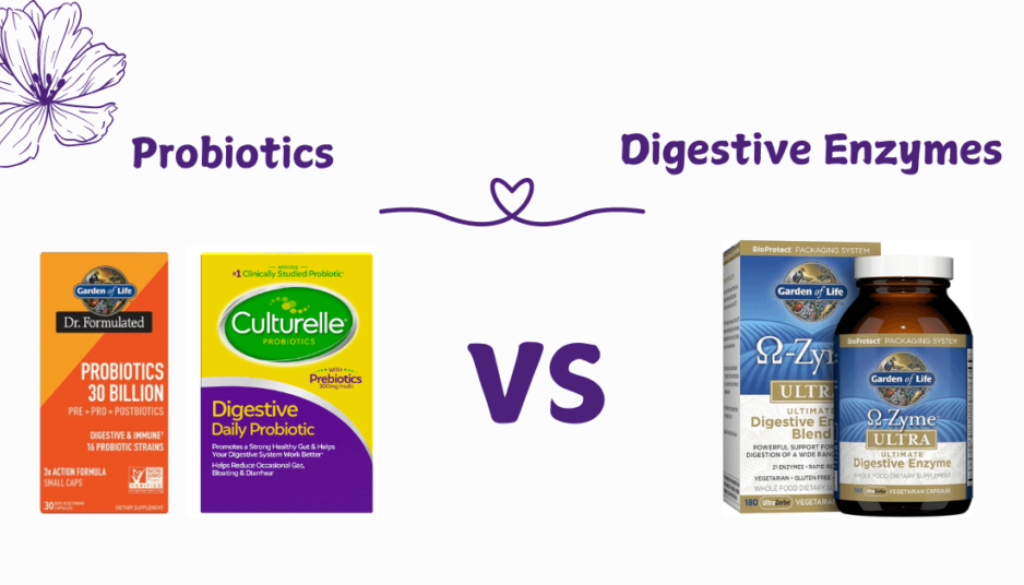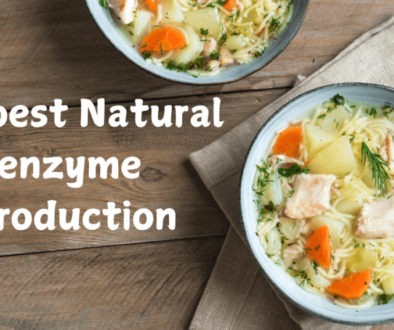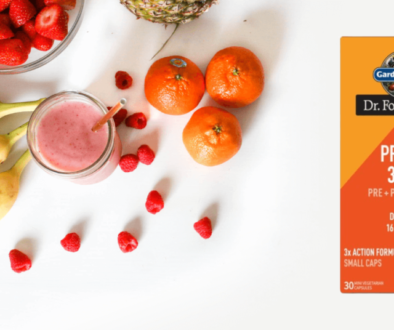Key Differences Between Digestive Enzymes and Probiotics: What You Need to Know
wwwtheshe.com Digestive enzymes, Probiotic's for women 0
Key Differences Between Digestive Enzymes and Probiotics: What You Need to Know
Let’s talk gut health—a topic that’s way more important than most of us realize. When you hear about “digestive enzymes” and “probiotics,” do you wonder what they actually do? You’re not alone. These two play vital but different roles in keeping your digestive system running smoothly. Let’s break it down so you can make the best choice for your gut.
What Are Digestive Enzymes?
Imagine your digestive system as a factory. Digestive enzymes are like the workers on the assembly line, breaking down the food you eat into tiny, usable parts. Here’s how they work:
- Amylase: Tackles carbs, turning them into simple sugars.
- Protease: Breaks down proteins into amino acids.
- Lipase: Handles fats, converting them into fatty acids and glycerol.
Your body makes these enzymes naturally, but sometimes it needs a little help—especially if you’re dealing with issues like lactose intolerance or a sensitive stomach. That’s where enzyme supplements come in handy.
For more information on digestive enzymes, check out our article on Natural Ways to Boost Enzyme Production.
What Are Probiotics?
Probiotics are the friendly bacteria your gut loves. Think of them as the peacekeepers in your digestive system, making sure everything stays balanced. You can find these little helpers in fermented foods like yogurt and sauerkraut, or in supplement form.
A gut that’s rich in probiotics is like a well-oiled machine. It not only aids digestion but also:
- Boosts Your Immune System: Keeps you healthier and more resilient.
- Supports Mental Health: Yes, your gut and brain talk to each other more than you’d think!
- Balances Digestion: Helps you process food efficiently and feel good overall.
How Do Digestive Enzymes and Probiotics Differ?
Here’s the lowdown:
- Digestive Enzymes: They’re the heavy lifters, breaking down your meals into nutrients.
- Probiotics: They’re the caretakers, maintaining harmony among the various bacteria in your gut.
So, while enzymes do the heavy work, probiotics ensure the work environment is just right.
For a deeper dive into the science, check out this study on digestive enzymes and probiotics from the National Institutes of Health (NIH).
Do You Need Digestive Enzymes, Probiotics, or Both?
Your digestive needs are unique, so let’s figure out what’s best for you:
- Digestive Enzymes: If you often feel bloated or gassy after meals, especially after eating certain foods like dairy or gluten, enzymes might be the solution you need.
- Probiotics: Have you been on antibiotics recently, or do you have recurring digestive issues? Probiotics could be your gut’s best friend.
Many people find that combining both gives their digestive system the full support it needs.
Can Digestive Enzymes and Probiotics Be Taken Together?
Absolutely! In fact, many supplements are designed to include both, offering a one-two punch for your digestive health. Taking them together can:
- Boost your digestion
- Reduce discomfort after meals
- Enhance nutrient absorption
- Keep your gut in tip-top shape
What Are the Benefits of Taking Digestive Enzymes?
Digestive enzymes aren’t just helpful; they can be game-changers:
- Banish Bloating and Gas: Say goodbye to that uncomfortable post-meal bloat.
- Improve Nutrient Absorption: Make sure your body is getting the most from your meals.
- Ease Indigestion: Help your system handle tricky foods like dairy or gluten.
- Support Digestive Conditions: Perfect for managing issues like lactose intolerance or gluten sensitivity.
What Are the Benefits of Taking Probiotics?
Probiotics are the unsung heroes of your gut, offering benefits that go beyond digestion:
- Enhance Gut Health: Keep your gut bacteria in balance, which is crucial for overall health.
- Strengthen Your Immune System: Help your body fend off illness.
- Reduce IBS Symptoms: Manage discomfort, bloating, and irregularity.
- Support Mental Well-being: A happy gut can contribute to a happier you!
Are There Any Side Effects?
Both digestive enzymes and probiotics are generally safe, but like anything, they can have mild side effects:
- Digestive Enzymes: If you take too much, you might experience stomach cramps or diarrhea. Start slow and see how your body responds.
- Probiotics: Some people feel a bit gassy or bloated when they first start taking probiotics. Don’t worry—this usually goes away as your body adjusts.
Which Should You Choose?
Choosing between digestive enzymes and probiotics comes down to what you need:
- Digestive Enzymes: Perfect if you struggle with digesting certain foods or frequently experience bloating and gas.
- Probiotics: Ideal if you’re looking to improve your overall gut health or manage conditions like IBS.
For many, a combo of both is the golden ticket to a happy, healthy gut.
Top 5 Digestive Enzymes of 2024
- Enzymedica Digest Gold
- Features: Contains a broad spectrum of enzymes, including protease, amylase, and lipase.
- Benefits: Supports comprehensive digestion and nutrient absorption.
- Garden of Life Omega-Zyme
- Features: Includes 22 different digestive enzymes plus omega-3 fatty acids.
- Benefits: Helps with the breakdown of fats, proteins, and carbohydrates for better digestion.
- Doctor’s Best Digestive Enzymes
- Features: Provides a blend of digestive enzymes to aid in the digestion of proteins, fats, and carbohydrates.
- Benefits: Enhances nutrient absorption and helps reduce digestive discomfort.
- Now Foods Super Enzymes
- Features: Contains a blend of digestive enzymes including bromelain, papain, and pancreatin.
- Benefits: Supports digestion and helps alleviate bloating and gas.
- Thorne Research Digestive Enzymes
- Features: Includes enzymes to support the digestion of proteins, fats, and carbohydrates.
- Benefits: Promotes healthy digestion and reduces symptoms of indigestion.
Top 5 Probiotics of 2024
- Align Probiotic
- Features: Contains Bifidobacterium 35624™, known for its digestive health benefits.
- Benefits: Supports gut health and helps manage symptoms of IBS.
- Garden of Life Dr. Formulated Probiotics
- Features: Offers a high-potency blend of 50 billion CFU from 16 different probiotic strains.
- Benefits: Supports digestive health, immune function, and overall well-being.
- Culturelle Digestive Health Probiotic
- Features: Contains Lactobacillus rhamnosus GG, a clinically studied probiotic strain.
- Benefits: Promotes digestive balance and supports immune health.
- Bio-K+ Probiotic
- Features: Includes Lactobacillus acidophilus and Lactobacillus casei, available in capsules and drinkable forms.
- Benefits: Supports gut health and can help with digestive discomfort.
- Nature’s Way Primadophilus Optima
- Features: Contains 12 probiotic strains and a shelf-stable formulation.
- Benefits: Promotes a balanced gut microbiome and enhances digestive function.
Wrapping Up
Digestive enzymes and probiotics are essential for a happy gut, but they work in different ways. Understanding how each works can help you make informed choices about which one—or both—might be right for you. Listen to your body, consult with a healthcare professional if needed, and give your gut the care it deserves!



